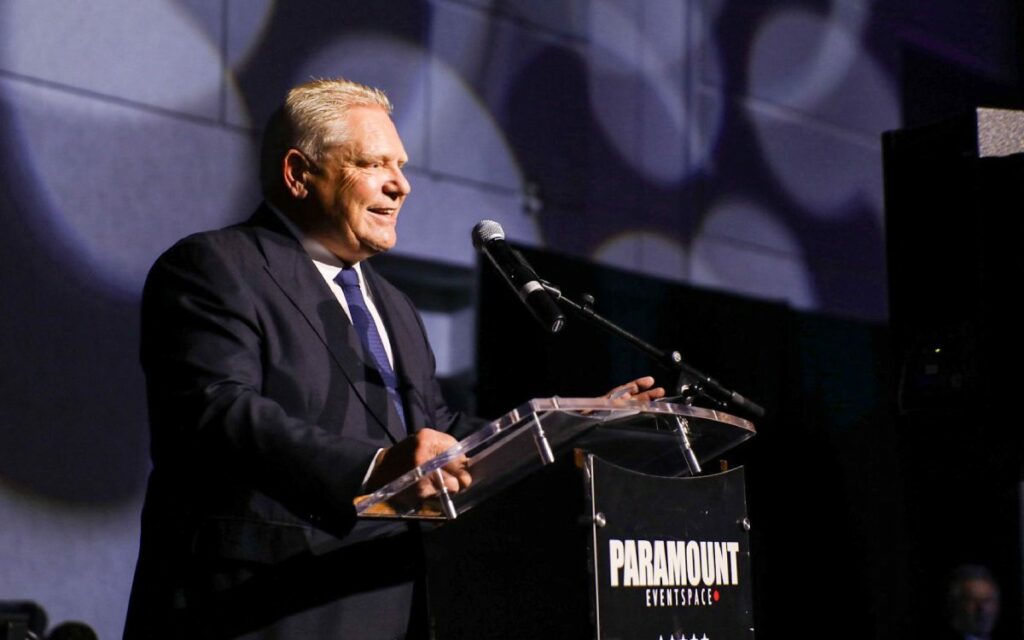
Premier Doug Ford said Toronto’s request was the “craziest thing he’s ever heard.” Photo Credit: Doug Ford/X.
Some days Premier Doug Ford nails it. Last week, in response to the City of Toronto’s request of the federal government to decriminalize drug use in the city, he said it was the “craziest thing he’s ever heard.”
“Sometimes I wonder where people’s brains are,” he said.
Good point. As other jurisdictions like British Columbia try to pull back from their rush to allow public drug use, Toronto is about to blindly jump in.
The city is already struggling to get people back downtown. COVID’s “work from home” style is tough to shake, and it is only being aggravated by serious traffic congestion and people’s fears for their safety.
Let’s add more people being allowed to take drugs in city parks, public buildings and transit vehicles. What could possibly go wrong?
If British Columbia’s experience is any example, plenty.
In 2022, the federal government allowed BC to decriminalize possession and use of small amounts of drugs like the deadly fentanyl, cocaine, methamphetamine and heroin. It was supposed to have been a three-year trial in adopting a public health approach that focused on supportive care for addicts instead of criminally charging them.
This, said the activists pushing for ever more liberal drug policies, will reduce the stigma of drug addiction, cut overdose deaths and keep communities safer.
Unfortunately, that has not been the result.
Instead, overdose deaths are up, public use on the streets, in parks and other public spaces, including hospital emergency rooms has exploded and the public, once highly supportive of decriminalization, is demanding action.
In the words of BC’s Premier, David Eby, who is asking Ottawa to reverse the decision, “sometimes tough love is needed….while we are caring and compassionate for those struggling with addiction, we do not accept street disorder that makes communities feel unsafe.”
His first attempt to fix the problem was to introduce provincial legislation, once again curtailing public drug use. But the law was thrown out by BC’s Supreme Court who took the position that somehow, public drug use was now a new human right.
Eby then turned to Ottawa for help. So far, Mental Health and Addictions Minister Ya’ara Saks is still “reviewing” the request.
You would have thought that given this experience, along with similar results in the state of Oregon and in Portugal, Toronto might have paused to weigh the evidence. But no, the city’s Medical Officer of Health, Eileen de Villa, backed up by Mayor Olivia Chow seem determined to plough ahead.
Dr. Alexander Caudarella, CEO of the Canadian Centre on Substance Use and Addiction testified before the House of Commons health committee recently that decriminalization was not the answer. She called for a spectrum of care that included treatment, recovery, harm reduction and prevention.
Ford, whose own family knows something about fighting addiction from the public troubles experienced by his brother Rob when he was Toronto’s Mayor, highlighted this point when he vowed to fight the city’s request. “I will fight this tooth and nail,” he said.
Citing his own government’s current $3.8 billion investment into mental health and addiction treatment, Ford called for more such support rather than Toronto’s approach which will encourage even more public drug use and risks to community safety.
Where are their brains indeed?

Janet Ecker is a former Ontario Finance Minister, Minister of Education, Minister of Community and Social Services and Government House Leader in the governments of Premier Mike Harris and Premier Ernie Eves. After her political career, she served as the founding CEO of the Toronto Financial Services Alliance, a public-private partnership dedicated to building Toronto region into an international financial centre. She currently sits on a number of corporate and non-profit boards, agencies and advisory committees.
Ms. Ecker received the Order of Canada for her public service contributions and was recognized as one of the “Most Influential People in the World’s Financial Centres” by Financial Centres International. She also received a “Canada’s Most Powerful Women: Top 100 Award” from the Women’s Executive Network and the Richard Ivey School of Business, among other awards. She is also one of the founders of Equal Voice, a national, multi-partisan organization working to elect more women.




















